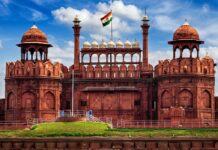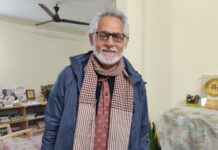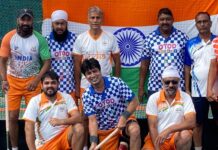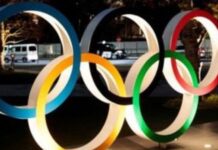[vc_row][vc_column][vc_column_text]
The country achieves the highest tally in the Quadrangular Games while Golden boy Neeraj Chopra emerges new poster boy of Indian athletics.
India opened and closed its participation in the Tokyo Olympics in a dramatic and classy fashion the likes of which the country has never done before in these Quadrangular Games.
The Country has won a medal on the first day of the Games – a silver by Mirabhai Chanu in Weightlifting – an unheard-of achievement till then and closed it with a first-ever Olympic Athletic Gold convincingly won by Javelin thrower Neeraj Chopra.
In between, India won a silver and bronze in Wrestling, a bronze each in Boxing, Badminton, and Men’s Hockey in all, the country claimed seven medals – 1 gold, 2 Silver, four bronze – its highest tally in the Olympics so far. Neeraj Chopra (gold), Mirabhai Chanu, Ravi Dahiya (Silver each) Lovelina, PV Sindhu, Bajrang Punia, and Men’s Hockey team (bronze) were the medal winners
Half an hour before Neeraj Chopra’s javelin final, wrestler Bajrang Punia risked a career-threatening injury to beat Kazakh wrestler Daulet Niyazbekov to win a bronze. That medal took the Indian tally to six but before that on the morning of the last day, golfer Aditi Ashok finished fourth after being in the contention till the end of the fourth round.
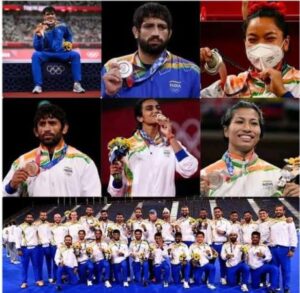

Till Neeraj won the gold, India despite having six medals in its kitty was lying at 60th place and one yellow medal propelled it into 50 club. This shows how valuable is gold medal in the Olympics.
Though Chanu gave India an unprecedented start in Tokyo, the Indian campaign lost the steam the same day with high-profiled shooters failing to deliver. Though there were expectations from the lone weightlifter, all excitement and hopes were focused on the shooters. But pistol marksman Saurabh Chaudhary and rifle ace Elavenil Valarivan flopped.
The 26-year-old Manipur lifter assured herself and the country the first medal with a total lift of 202kg . This was India’s second medal in weightlifting after Karnam Malleswari’s bronze in the 2000 Sydney Olympics.
As one shooter after another – there were 15 in total – failed to produce their much-vaunted world-class form, despair was visible in the Indian camp. At the end of the tenth day of the Games, Indians earned their third medal while the same day Jamaica won three medals in women’s 100m and a cynical reporter put it this way. “What India did in ten days, Jamaicans did in ten seconds”, a very harsh but to-the-point comment.
Pre-Olympic hype was built on the expected medal rush including one or two golds from the shooters who were gunning down records after records in the world cups. Archers were another disappointment.
Participants in ten other sports disciplines went by the script that participation in the Olympics is more important than winning. Judo, Gymnastics, Fencing, Rowing, Sailing, Table Tennis, Swimming, Tennis, and Equestrian expectedly produced no results except a few slightly better showings here and there.-
Shuttler PV Sindhu beat China’s He Bingjiao for a bronze, her second at the Olympics after the silver at 2016 Rio, and that lifted the morale of the contingent. Wrestler Ravi Dahiya made it to the 57kg freestyle final with ease and though he lost the final to a two-time world champion, his courageous display was very impressive. Lovlina Borgohain gave her best to win a bronze.
The men’s hockey team bagged a bronze, a medal in hockey after a gap of 41 years, fighting back to beat Germany in a close encounter for the 12th Olympic medal in the sport.
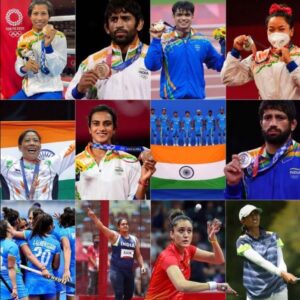

Though some genuine medal hopes – Wrestler Vineh Phogat, Boxer Amit Panghal, Archer Deepika Kumari disappointed, some others produced extraordinary performances which made every sports buff in India proud.
In the super-heavyweight category, Injured Boxer Satish Kumar with stitches above his eye and on his chin put up a tremendous fight against world No. 1 Bakhodir Jalolov of Uzbekistan, and even in defeat he came out of the ring with his head held high.
Rani Rampaul led the women’s hockey team created history by defeating top-ranked Australia 1-0 but went down 3-4 to Great Britain in the bronze medal contest.
In athletics, Discus Thrower Kanwal Preet made it to the final while 4x400m men’s relay team broke the Asian record.
The golden moment for India came at the very end of the penultimate day of games when after 13 years, Javelin Thrower Neeraj Chopra broke the jinx and became the first Indian track and field athlete in history to win a gold medal.
Neeraj Chopra and the Subedar with 4 Rajputana Rifles created history by hurling the spear to a distance of 87.58 metres.
Beijing Olympic gold medalist Abhinav Bindra welcomed Chopra to “the Club”. “It is not the most happening of places yet and needs more members, but I feel your entry is going to pave the way for many more deserving athletes,” he tweeted
A look back at the performance of India in the Olympics at the start of this century shows that in 2000 at Sydney Olympics India, with one bronze medal, finished joint 71 on Medal table, moved up a sixth place to be at 65th, with one Silver at 2004 Athens, climbed to 51st place at Beijing with one gold and two bronze.
At London, India had the best haul of six medals (till then) (two Silver and 4 Bronze) but still slipped to 57th place. In 2016, India had only two medals to show (a Silver and a bronze) and hurtled down to 67 places and now at Tokyo with its best-ever medal haul of 7 – one Gold, two silver, and four bronze) – the country finished 48th and moved up to the top-fifty club.
Leave alone the sports powerhouse nations like the US (133 medals including 39 Gold) China (88 medals including 38 Gold) Japan (58 medals including 27 Gold) Great Britain (65 medals including 22 Gold), ahead of India were tiny Jamaica (21) with 9 medals including 4 Gold, Serbia (28th) Uzbekistan (32) Uganda (36) Israel (39) Kosovo and Bahamas (joint 42) to name a few.
This time India sent its largest 228-member contingent (127 sportspersons 111 officials and support staff) to the Olympics for 18 events. In 2016 at Rio, 117 athletes participated in 15 sports and ended with two medals. In 2012 at London, 83-member Indian contingent took part in 13 sports for six medals
The 2008 Beijing Olympics was historic for India for three reasons. It was the first time since 1928 Indian men’s hockey failed to qualify for the Games, second shooter Abhinav Bindra became the first sportsperson from the country to win the Olympic Individual Gold and also country won more than one medal in the games.
[/vc_column_text][/vc_column][/vc_row]
Disclaimer: We do undertake rigorous checks on content provided by contributors before publishing the same. If you come across some factual errors, kindly bring this into our notice and we shall review your objection and claim as per our policy and display correction credits and corrections on the article itself.
The opinion expressed in the article is of the writer. Writer is a freelance journalist/journalist based in Delhi

